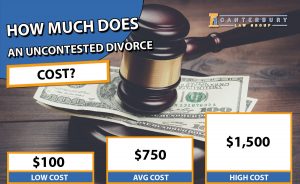Whether you are liable for your spouse’s debts depends on whether you live in a community property or equitable distribution state.
Whether you and your spouse are responsible for paying each other’s debts will depend primarily on where you live. If your state follows “common law” property rules, spouses are only liable for their own debts, with a few exceptions. For instance, both spouses must pay debts for family necessities like food, shelter, or tuition for the kids, although how states treat joint and separate debts varies slightly, so you’ll want to check your state laws.
However, if you live in one of a few states with “community property” rules, both you and your spouse will owe most debts incurred by either one of you during the marriage.
Keep reading to learn more about:
- when you owe your spouse’s debts, and
- how community property laws will affect you and your spouse in bankruptcy.
If you plan to file for bankruptcy in California or another community property state, you’ll want to know about the “limited community property discharge” that arises when only one spouse files for bankruptcy. Although all community property will be safe from creditor collection, the nonfiling spouse’s separate property will remain at risk.
Community Property States
The states that follow community property rules are Arizona, California, Idaho, Louisiana, Nevada, New Mexico, Texas, Washington, and Wisconsin. (In Alaska, spouses can sign an agreement making their assets community property, but few people choose to do this.)
When Are You Responsible for Your Spouse’s Debt?
In community property states, most debts incurred by either spouse during the marriage are owed by the “community” (the couple), even if only one spouse signed the paperwork for a debt. The key here is during the marriage. So if you incur a debt, such as a credit card balance, while you’re single and then get married, it won’t automatically become a joint debt. However, an exception can occur when a spouse signs on to an account as a joint account holder after getting married. Some states, like Texas, have a more nuanced way of analyzing who owes what debts by evaluating who incurred the debt, for what purpose, and when.
After a legal separation or divorce, only the spouse who incurred the debt owes it unless the debt was incurred for family necessities, to maintain jointly owned assets (for example, to fix a leaking roof), or if the spouses keep a joint account.
If you’re considering wiping out debt in bankruptcy with a debt discharge, start by learning how bankruptcy works and what to avoid before filing for bankruptcy.
How Are Income and Property Shared Between Spouses?
In community property states, couples share income, as well. All income earned by either spouse during marriage and property bought with that income is community property, owned equally by husband and wife. Gifts and inheritances received by one spouse and separate property owned before marriage that remains separate are the respective property of one spouse alone. Comingling a gift or inheritance, such as by adding it to a joint bank account, could erase the protection. All income or property acquired after a divorce or permanent separation is also separate.
What Property Can Be Taken to Pay Debts?
In a community property state, creditors of one spouse can go after the assets and income of the married couple to make good on joint debts, and remember, most debts incurred during marriage are joint debts.
You’ll find out more about when you’re responsible for your spouse’s business debt here.
Creditors can go after joint assets in a community property state no matter whose name is on the asset’s title document. For example, a business owner’s name might not be on the title to her spouse’s boat. Still, in most community property states, that won’t stop a creditor from suing in court to take the boat to pay off the business owner’s debts assuming the boat was purchased with community funds and not separate funds.
Community property collection rules also apply to a spouse’s separate debt, such as one spouse’s child support obligation from a prior relationship, or a debt in one spouse’s name only where the spouse hid the marriage. In that case, a creditor can go after only that spouse’s half of the community property to repay the debt.
Do You Owe Your Spouse’s Student Loans?
With one exception (see below), the community property rules apply to student loan debt the same way they apply to other debts acquired during the marriage. Both spouses are responsible 100% for a student loan taken out during the marriage even though only one spouse signed for it. When the parties divorce, each spouse will be awarded 50% of the debt in the property settlement.
California presents an exception to the rules applied in other community property states. According to California law, student loans aren’t community debts, and a judge doesn’t have to split this kind of debt 50/50.
Recognizing that a student loan can benefit both spouses, California takes a more equitable approach than other states. In assigning each spouse a percentage of the outstanding student loan, a judge will consider factors like:
- the effect of the course of study on the community
- whether the other spouse also went to school, and
- the course of study’s effect on the spouse’s ability to support the community.
How to Remove a Spouse’s Liability
Couples in community property states can sign an agreement with each other to have their debts and income treated separately. Signing a pre- or postnuptial agreement like this can make sense for a couple before one spouse goes into business. But if you’re already in business, signing an agreement now won’t protect your spouse from liability for business debts that you already owe, only from liability for future business debts.
Keep in mind that this agreement will be between you and your spouse. It likely won’t affect whether a creditor can pursue you for debt, only your ability to pursue your spouse’s personal assets for payment. Check with your family law lawyer or bankruptcy lawyer for clarification.
You can also sign an agreement with a particular store, lender, or supplier, stating that the creditor will look solely to your separate property for repayment of any debt, essentially removing your spouse’s liability for any obligation or debt from the contract—if you can get the other party to agree.
How Does Bankruptcy Work in Marriage?
If only one spouse files for Chapter 7 bankruptcy in a community property state, creditors can collect community debts against the nonfiling spouse. However, the creditor can’t forcibly take community assets to pay community debt discharged in the filing spouse’s bankruptcy. The creditor can only collect against the nonfiling spouse’s separate property.
This protection is known as a “limited community property discharge.” (11 USC § 524(a)(3).) Also, if you’re considering divorce, talk with your lawyer about the effect the divorce will have on your limited community discharge. You could likely lose its protection. Learn more about filing for bankruptcy without your spouse.
Source
https://www.nolo.com/legal-encyclopedia/debt-marriage-owe-spouse-debts-29572.html







